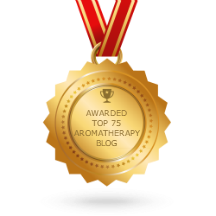Okay. I admit it. I usually use one of those commercial toilet cleaners...thick blue stuff with a pointed spout that would squirt up all around the rim of the commode and drip on down into the water, cleaning and sterilizing the one thing in the house we don't want to talk about. BUT...first of all, it's child proof cap was really hard for me to open. And then I read the ingredients, and the warnings. YUCK This is not something I want in my house. So when it ran out, I didn't rebuy.
But then the toilet got dirty. Yuck.
Vinegar, baking soda, and,

of course, Essential Oils.
I am fairly sure that the
recipe I read somewhere
called for Tea Tree Oil.
I wasn't in the mood for Tea Tree. I choose some Black Spruce Oil. But you could use any oil that smells clean and fresh to you.
(If your family has been battling illness then perhaps tea tree or another powerfully antibacterial oil might be more appropriate. There are no rules!)
 I poured somewhere between 1/2 cup and 1 cup of baking soda into the water in the toilet bowl. Then I added 8 or 10 drops of essential oil to a generous half cup (perhaps a cup?) of White Vinegar.
I poured somewhere between 1/2 cup and 1 cup of baking soda into the water in the toilet bowl. Then I added 8 or 10 drops of essential oil to a generous half cup (perhaps a cup?) of White Vinegar.
Pour the scented vinegar into the toi let bowl, on top of the baking soda. The picture I took of the foam didn't work, you can't really see white foam in a white bowl. Sorry! While it is still foaming, grab the brush and swish that foam around to all the crevices. Then flush. (You know how to do this, why am I explaining?) This was easier than wrestling with the Grandma Proof lid on the nasty blue stuff. And I always have White Vinegar and Baking Soda in. Someday we'll do another blog about what we do with those two.
let bowl, on top of the baking soda. The picture I took of the foam didn't work, you can't really see white foam in a white bowl. Sorry! While it is still foaming, grab the brush and swish that foam around to all the crevices. Then flush. (You know how to do this, why am I explaining?) This was easier than wrestling with the Grandma Proof lid on the nasty blue stuff. And I always have White Vinegar and Baking Soda in. Someday we'll do another blog about what we do with those two.
No one enjoys cleaning the bathroom. The Black Spruce and the lack of nasty things made it better.
 let bowl, on top of the baking soda. The picture I took of the foam didn't work, you can't really see white foam in a white bowl. Sorry! While it is still foaming, grab the brush and swish that foam around to all the crevices. Then flush. (You know how to do this, why am I explaining?) This was easier than wrestling with the Grandma Proof lid on the nasty blue stuff. And I always have White Vinegar and Baking Soda in. Someday we'll do another blog about what we do with those two.
let bowl, on top of the baking soda. The picture I took of the foam didn't work, you can't really see white foam in a white bowl. Sorry! While it is still foaming, grab the brush and swish that foam around to all the crevices. Then flush. (You know how to do this, why am I explaining?) This was easier than wrestling with the Grandma Proof lid on the nasty blue stuff. And I always have White Vinegar and Baking Soda in. Someday we'll do another blog about what we do with those two.No one enjoys cleaning the bathroom. The Black Spruce and the lack of nasty things made it better.



